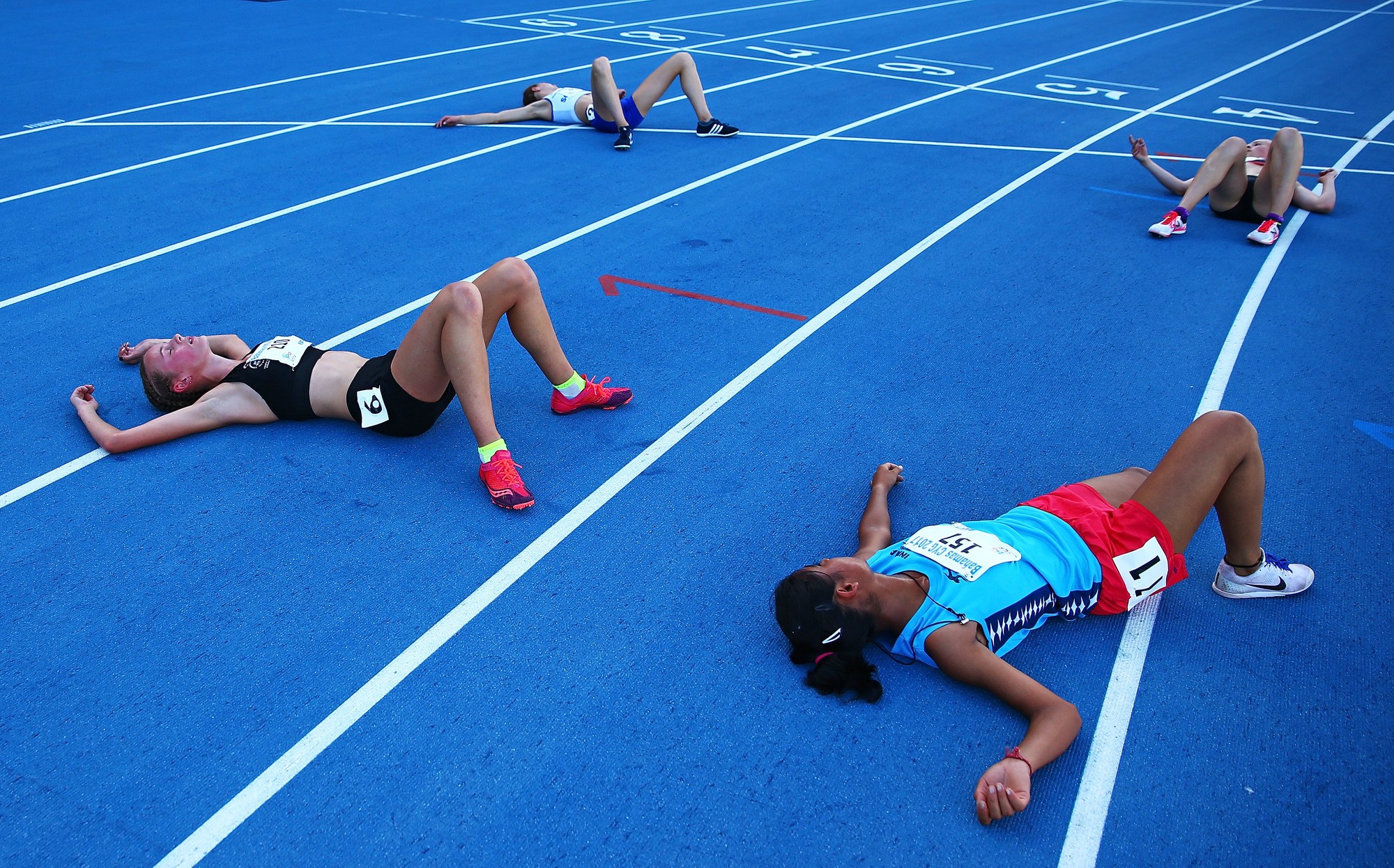The Semenya Rule
-
@taniwharugby said in The Semenya Rule:
@jegga I dont think anyone comes out of this looking good.
They were talking on the radio yesterday about possible breach of human rights forcing her to take drugs to compete?
How common is her 'condition/advantage'?
what about other natural anomolies?
If she wants to compete as a women. Conversely, compete in an "open" category.
-
@mariner4life said in The Semenya Rule:
@antipodean said in The Semenya Rule:
@Salacious-Crumb said in The Semenya Rule:
Semenya has got some new competition.
Stick a fork in womens Olympics.
Transgender atheletes to be allowed to compete as the other sex in the Olympics WITHOUT having gender reassignment surgery
The International Olympic Committee received proposed guidelines at its 'Consensus Meeting on Sex Reassignment and Hyperandrogenism'
The policy change would allow transgender athletes to compete without having gender reassignment surgery
It would allow transgender athletes to compete after one year of hormone replacement therapy and no surgery is required
This is a good development - there should be one category for Olympics: Citius, Altius, Fortius. So women, trans and disabled people can participate by watching from the stands.
the way the Greeks intended
Um, no.
Women weren't allowed at the Olympics, but that doesn't mean they had no games. Their games were the Herean Games.
Evidence is skimpy, true, but on balance it seems that the Greeks were quite happy to have women only athletic events.
-
@Chester-Draws our tour guide told us it was only Married women who were not allowed (cos nudity) but single women were, pretty sure I had read that too
-
They kept saying on the radio that she was born a woman but she wasn't was she? She was born with testicles I believe. I get that being a genetic freak is often what makes the difference between the greats and those making up the numbers, but if she is also a dude that does seem a tad unfair for those who are 100%.
Do feel incredibly sorry for her. Imagine being born like that and then having to go through all this.
-
@booboo But there's a clear reason why the rule is specific. That's what CAS asked of the IAAF in 2015 after the Chand case. So the IAAF did research which wasn't very convincing and found a advantage in these specific events. The problem is had the IAAF's research not stop at 2011 and 2013 World Champs, but include 2015, 2017 and 2016 Olympics the results might have been far more conclusive. I listened to an interview with an American transgender person, whose in the medical field and was one of the people who drafted the IAAF DSD and Transgender policies. According to her, the 2016 Olympic for final for 800m Women, in all likelihood, 6 out of the 8 women were either DSD or similar.
-
This is a really good read https://quillette.com/2019/05/03/a-victory-for-female-athletes-everywhere/
-
@jegga said in The Semenya Rule:
This is a really good read https://quillette.com/2019/05/03/a-victory-for-female-athletes-everywhere/
cheers @jegga really good read. Some strong arguments for the restriction
-
@jegga said in The Semenya Rule:
This is a really good read https://quillette.com/2019/05/03/a-victory-for-female-athletes-everywhere/
Outstanding article. This part drives home the point:
Without an eligibility rule based in sex-linked traits, we wouldn’t see female bodies on any podium. Equally important, without such an eligibility rule, it’s unlikely that societies could continue legally to sustain separate girls and women’s only sport. The set-aside is premised on inherent biological differences between the sexes. If that basis were eliminated, it’s unclear how the classification would pass muster under standard legal anti-discrimination analysis
-
Very good article.
Only confusion for me is that seem happy to allow medication to drop T levels to compete. What about all the benefits accrued over puberty or a lifetime of high T levels?
Not all of them will be reduced to the woman’s range.
So it seems like they have an approved dopping path.
-
@Rancid-Schnitzel said in The Semenya Rule:
Without an eligibility rule based in sex-linked traits, we wouldn’t see female bodies on any podium.
I don't really have a strong opinion either way on this - but this isn't a particularly compelling argument. A Caucasian (or asian) man hasn't been in the 100m final in my lifetime let alone the podium. I wouldn't advocate to somehow level the playing field to see that happen.
-
@rotated said in The Semenya Rule:
@Rancid-Schnitzel said in The Semenya Rule:
Without an eligibility rule based in sex-linked traits, we wouldn’t see female bodies on any podium.
I don't really have a strong opinion either way on this - but this isn't a particularly compelling argument. A Caucasian (or asian) man hasn't been in the 100m final in my lifetime let alone the podium. I wouldn't advocate to somehow level the playing field to see that happen.
You missed the other part in the article where she addresses this very point. We celebrate variations inside the sexes (height, speed, etc) that help performance.
And in these variations you can get an Asian or Caucasian successful sprinter, although rarely.
The difference between the sexes is you would get no woman at all having success. In fact they would struggle against boys. They took one year of results (2017) and compared it against lifetime bests for Olympic champions. Tens of thousands of men and boy results in one year that obliterated their PBs.
Allowing men levels of T in the woman’s category means the end of woman’s sport.
-
@Rancid-Schnitzel said in The Semenya Rule:
Without an eligibility rule based in sex-linked traits, we wouldn’t see female bodies on any podium.
And this is also wehre some people get wound up. THere has to be a line somewhere - but where do you draw it? The problem with protected classes of sport is that you always have people wanting to come in and dominate.
This has some strong parallels with age-based restrictions. Shahid Afridi finally copped to not actually being 16, but 19 when he played ODI for the first time. That's at least open - but imagine being a 16 year old facing a 19 year old cricketer. IT's not a level playing field. I think this is what a number of female athletes face.
Finally, the 'fix' appears to be as simple as taking a birth control pill for most people (according to the article). If taking birth control destroys your ability to compete, I think the line is probably in the right place.
-
@rotated said in The Semenya Rule:
A Caucasian (or asian) man hasn't been in the 100m final in my lifetime let alone the podium. I wouldn't advocate to somehow level the playing field to see that happen.
In the 100 m final at the 2013 World Championships in Moscow, Christophe Lemaitre finished in seventh place in a time of 10.06. (And he won a bronze medal in the 200m at Rio, so you've seen a white sprinter on the podium.)
And Alan Wells back in 1980 would have been in the fastest 8.
But it has been a long drought between those two.
In the meantime, the number of top end black swimmers is equally low.
-
This post is deleted!
-
@jegga said in The Semenya Rule:
This is a really good read https://quillette.com/2019/05/03/a-victory-for-female-athletes-everywhere/
Excellent read.
Interesting to note the medallists behind Semenya were both also confirmed or likely DSD. So it appears it's not just the Semenya rule.
Was pondering this whole point further.
The upshot is you have two categories of athlete based on sex. But you have to define where that sits on the gender spectrum.
The split is either:
- men and non-men, or
- women and non-women (women and open)
To my mind the latter is the fairest.
Then you have to define where the line is (could ask the Aussie cricketers ... ?). You set some objective definitions that can be measured.
Pass and you can compete in the restricted category..
Probably a repeat of a number of points above, but just trying to put some words together to define it.
-
@Chester-Draws said in The Semenya Rule:
@rotated said in The Semenya Rule:
A Caucasian (or asian) man hasn't been in the 100m final in my lifetime let alone the podium. I wouldn't advocate to somehow level the playing field to see that happen.
In the 100 m final at the 2013 World Championships in Moscow, Christophe Lemaitre finished in seventh place in a time of 10.06. (And he won a bronze medal in the 200m at Rio, so you've seen a white sprinter on the podium.)
And Alan Wells back in 1980 would have been in the fastest 8.
But it has been a long drought between those two.
In the meantime, the number of top end black swimmers is equally low.
Alan Wells won gold in 1980.
Admittedly sans Yanks.
-
Yet to read the article @jegga linked but this is the best I've read on Semenya. The reporting on this has been absolutely terrible.
-
Best article I've read on it.
Changed my mind.
Still feel very sorry for Semenya though.

 Latest - Quartz
Latest - Quartz